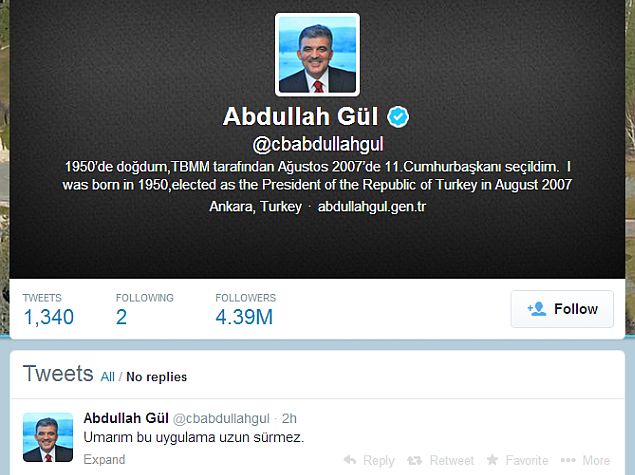- Home
- Social networking
- Social networking News
- Turkish president denounces government ban on Twitter
Turkish president denounces government ban on Twitter
By NDTV Correspondent | Updated: 21 March 2014 17:46 IST

Click Here to Add Gadgets360 As A Trusted Source

Advertisement
Turkish President Abdullah Gul tweeted on Friday to denounce the government's ban on Twitter, which had been introduced just hours earlier.
"A complete ban on social media platforms cannot be approved," tweeted the president to his more than four million followers.
Gul, a frequent user of social media, said it was not "technically possible to totally block access to platforms used all over the world".
Turkish authorities had blocked access to Twitter late Thursday after Prime Minister Recep Tayyip Erdogan threatened to "wipe out" the social network.
The state-run Anatolia news agency said authorities "technically blocked access to Twitter" because the service had ignored various Turkish court orders to remove some links deemed illegal.
Links of audio recordings and documents implicating Erdogan and other top officials in corruption have been posted on Twitter ahead of crucial local elections on March 30.
Critics claim it was an attempt by the government to clampdown on the spread of corruption allegations targeting Erdogan and his inner circle.
Turkey in the past blocked access to YouTube, but it is the first ban on Twitter, which is hugely popular in the country and was instrumental in organizing flash protests against the government last year. Uproar over the recordings has damaged the government's reputation ahead of local elections this month.
(Also see: Turkey has no plans to block social media apart from Twitter)
Despite the ban, tech-savvy users managed to tweet links to the recordings on Friday. President Abdullah Gul, a political ally of Erdogan's, was among those who circumvented the order, which he contested in a series of tweets.
In his Twitter message, Gul said relevant pages could be blocked in case of any violation of people's privacy but only through a "court order".
"I hope this ban will not last long," he added.
Turkey's lawyers' association also asked a court to overturn the country's ban on Twitter. Turkey's main opposition party also said it would seek a cancellation.
Written with inputs from AFP and AP
"A complete ban on social media platforms cannot be approved," tweeted the president to his more than four million followers.
Gul, a frequent user of social media, said it was not "technically possible to totally block access to platforms used all over the world".
Turkish authorities had blocked access to Twitter late Thursday after Prime Minister Recep Tayyip Erdogan threatened to "wipe out" the social network.
The state-run Anatolia news agency said authorities "technically blocked access to Twitter" because the service had ignored various Turkish court orders to remove some links deemed illegal.
Links of audio recordings and documents implicating Erdogan and other top officials in corruption have been posted on Twitter ahead of crucial local elections on March 30.
Critics claim it was an attempt by the government to clampdown on the spread of corruption allegations targeting Erdogan and his inner circle.
Turkey in the past blocked access to YouTube, but it is the first ban on Twitter, which is hugely popular in the country and was instrumental in organizing flash protests against the government last year. Uproar over the recordings has damaged the government's reputation ahead of local elections this month.
(Also see: Turkey has no plans to block social media apart from Twitter)
Despite the ban, tech-savvy users managed to tweet links to the recordings on Friday. President Abdullah Gul, a political ally of Erdogan's, was among those who circumvented the order, which he contested in a series of tweets.
In his Twitter message, Gul said relevant pages could be blocked in case of any violation of people's privacy but only through a "court order".
"I hope this ban will not last long," he added.
Turkey's lawyers' association also asked a court to overturn the country's ban on Twitter. Turkey's main opposition party also said it would seek a cancellation.
Written with inputs from AFP and AP
Comments
Catch the latest from the Consumer Electronics Show on Gadgets 360, at our CES 2026 hub.
Further reading:
Abdullah Gul, Social, Tayyip Erdogan, Turkey, Turkey PM, Turkish President Abdullah Gul, Twitter, micro blogging network, social media, social network
Popular on Gadgets
- Samsung Galaxy Unpacked 2025
- ChatGPT
- Redmi Note 14 Pro+
- iPhone 16
- Apple Vision Pro
- Oneplus 12
- OnePlus Nord CE 3 Lite 5G
- iPhone 13
- Xiaomi 14 Pro
- Oppo Find N3
- Tecno Spark Go (2023)
- Realme V30
- Best Phones Under 25000
- Samsung Galaxy S24 Series
- Cryptocurrency
- iQoo 12
- Samsung Galaxy S24 Ultra
- Giottus
- Samsung Galaxy Z Flip 5
- Apple 'Scary Fast'
- Housefull 5
- GoPro Hero 12 Black Review
- Invincible Season 2
- JioGlass
- HD Ready TV
- Laptop Under 50000
- Smartwatch Under 10000
- Latest Mobile Phones
- Compare Phones
Latest Gadgets
- OPPO Reno 15 FS
- Red Magic 11 Air
- Honor Magic 8 RSR Porsche Design
- Honor Magic 8 Pro Air
- Infinix Note Edge
- Lava Blaze Duo 3
- Tecno Spark Go 3
- iQOO Z11 Turbo
- Lenovo Yoga Slim 7x (2025)
- Lenovo Yoga Slim 7a
- Lenovo Idea Tab Plus
- Realme Pad 3
- Moto Watch
- Garmin Quatix 8 Pro
- Haier H5E Series
- Acerpure Nitro Z Series 100-inch QLED TV
- Asus ROG Ally
- Nintendo Switch Lite
- Haier 1.6 Ton 5 Star Inverter Split AC (HSU19G-MZAID5BN-INV)
- Haier 1.6 Ton 5 Star Inverter Split AC (HSU19G-MZAIM5BN-INV)
© Copyright Red Pixels Ventures Limited 2026. All rights reserved.


![[Sponsored] Haier C90 OLED TV | Dolby Vision IQ, 144Hz OLED and Google TV in Action](https://www.gadgets360.com/static/mobile/images/spacer.png)









